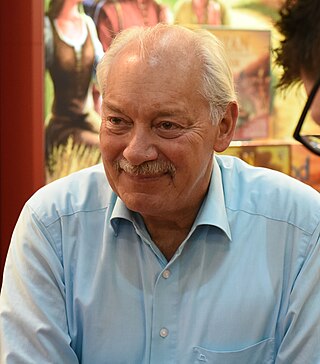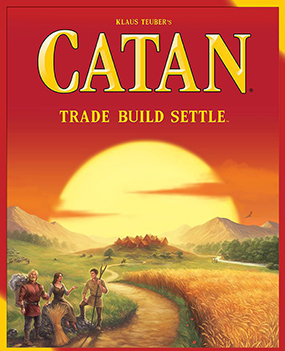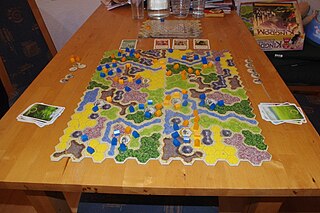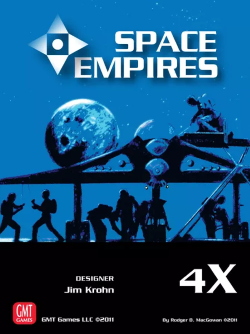
Elfenland is a German-style board game designed by Alan R. Moon and published by Amigo Spiele in German and Rio Grande Games in English in 1998. Elfenland won the Spiel des Jahres award in 1998.

Puerto Rico is a Euro-style board game designed by German designer Andreas Seyfarth and published in 2002 in a German-language edition by Alea. Players assume the roles of colonial governors on the island of Puerto Rico during the age of Caribbean ascendancy. Puerto Rico was the highest-rated game on the board game website BoardGameGeek for over five years, until it was surpassed by Agricola. The aim of the game is to amass victory points in two ways: by exporting goods and by constructing buildings.

Klaus Wilhelm Heinrich Teuber was a German board game designer best known as the creator of Catan. Originally working as a dental technician, he began designing games first as a hobby then as a full-time career.

Reiner Knizia is a prolific German-style board game designer. He was born in West Germany in 1957 and earned a doctorate in Mathematics from the University of Ulm before designing games full time. He is frequently included on lists of the greatest game designers of all time. Many of his hundreds of designs are considered modern classics, and many have won or been nominated for significant gaming awards, including the Spiel des Jahres and the Deutscher Spiele Preis. His notable designs include Amun-Re, Blue Moon City, Ingenious, Keltis, Lord of the Rings, Medici, Modern Art, Ra, Taj Mahal, Tigris and Euphrates, and Through the Desert. Many of his designs incorporate mathematical principles, such as his repeated use of auction mechanics.

Battleship is a strategy type guessing game for two players. It is played on ruled grids on which each player's fleet of warships are marked. The locations of the fleets are concealed from the other player. Players alternate turns calling "shots" at the other player's ships, and the objective of the game is to destroy the opposing player's fleet.

Mexica is a board game designed by Wolfgang Kramer and Michael Kiesling and published in 2002 by Ravensburger in German and Rio Grande Games in English. Mexica was awarded 5th prize in the 2002 Deutscher Spiele Preis.
Accasta is a stacking abstract strategy board game on a hexagonal board for two players. The game was designed by Dieter Stein and published solely over the web and in the German game design magazine Spiel & Autor.

Tikal is a German-style board game designed by Wolfgang Kramer and Michael Kiesling and published in 1999 by Ravensburger in German and by Rio Grande Games in English. Set in a Central American jungle, in Tikal players aim to discover artifacts, excavate, and maintain temple control to gain victory points.

Pirate's Cove is a board game designed by Paul Randles and Daniel Stahl, originally published in Germany in 2002 by Amigo Spiele, illustrated by Markus Wagner and Swen Papenbrock. In 2003, Days of Wonder republished the game with a new graphic design from Julien Delval and Cyrille Daujean. In the game, players play pirate ship captains seeking treasure from islands and bragging rights from defeating other pirates in naval combat.

Ingenious is the English name for Einfach Genial, a German abstract strategy board game designed by Reiner Knizia under commission from Sophisticated Games and published in 2004 by Kosmos. Across most of Europe it is titled as the local translation of Ingenious or Simply Ingenious, the notable exception being Mensa Connections in the UK.

Michael Kiesling is a German board game designer. Many of his games have been nominated for or have won the Spiel des Jahres, a German games award.

Jawbreaker is a port of SameGame for the Pocket PC bundled with the Microsoft Windows Mobile 2003 operating system for PDAs. The operating system, and thus the game, was officially released on April 7, 2003. The game itself was developed by American studio oopdreams software, Inc. Jawbreaker is officially listed as one of the "Core Applications" of the Windows Mobile software family, in a paper released by Microsoft. In Windows Mobile 5.0 and Windows Mobile 6.0 it is called Bubble Breaker. The original non-bundled version of the game is available from the developer itself as Bubblets.

Warrior Knights is a board game for 2–6 players originally published by Games Workshop in 1985, and later published by Fantasy Flight Games in 2006. Each player takes the role of a Baron vying to claim the throne of an unnamed kingdom. Gameplay revolves around raising an army, obtaining enough money to maintain that army, and gaining influence through a variety of means.
Marrakech is a board game designed by Dominique Ehrhard in which players are competing carpet traders in the city of Marrakech. It was first published in 2007. Its German edition has been renamed Suleika.

Catan, previously known as The Settlers of Catan or simply Settlers, is a multiplayer board game designed by Klaus Teuber. It was first published in 1995 in Germany by Franckh-Kosmos Verlag (Kosmos) as Die Siedler von Catan. Players take on the roles of settlers, each attempting to build and develop holdings while trading and acquiring resources. Players gain victory points as their settlements grow and the first to reach a set number of victory points, typically 10, wins. The game and its many expansions are also published by Catan Studio, Filosofia, GP, Inc., 999 Games, Κάισσα (Káissa), and Devir. Upon its release, The Settlers of Catan became one of the first Eurogames to achieve popularity outside Europe. As of 2020, more than 32 million copies in 40 languages had been sold.

Kingdom Builder is a strategy board game designed by Donald X. Vaccarino, published in 2011 by Queen Games with illustrations by Oliver Schlemmer in German, British and international versions.

Century: Spice Road is a 2017 table-top strategy game designed by Emerson Matsuuchi and distributed by Plan B Games. The game is a simulation of fifteenth-century spice trading, and each player competes for points as they buy and sell spices represented by colored cubes.

Space Empires 4X is a 4X science fiction board wargame developed by Jim Krohn and published by GMT Games in 2011. It has received two expansions: Close Encounters (2012) and Replicators (2018), with a third one, All Good Things, in development.
Battles of Westeros is a 2010 strategic wargame set in George R.R. Martin’s A Song of Ice and Fire universe. It was designed by Robert A. Kouba and published by Fantasy Flight Games.
















